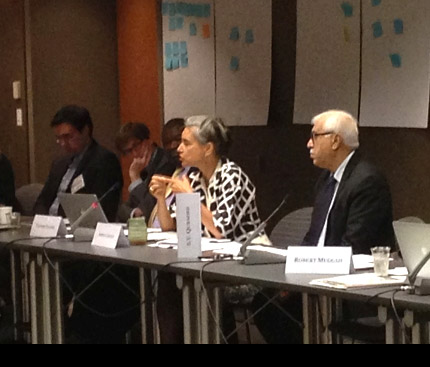
 Policymakers from East LA to West Africa struggle to implement policies to reduce violence and improve the rule of law, and often lack the time to review the available scholarship—which often comes up short in addressing the practical and political issues they confront on a daily basis.
Policymakers from East LA to West Africa struggle to implement policies to reduce violence and improve the rule of law, and often lack the time to review the available scholarship—which often comes up short in addressing the practical and political issues they confront on a daily basis.
Given this context and a desire to move the field forward, the World Justice Project, Carnegie Endowment for International Peace, and Stanford University brought together 40 leading scholars, practitioners, and policymakers in government last week in Washington D.C. to participate in Reducing Violence and Improving the Rule of Law: Organized Crime, Marginalized Communities, and the Political Machine. This invitation-only workshop targeted three spheres: reducing violence from political parties and elections, reducing violence by gangs, youth and the state in marginalized communities, and reducing violence from organized crime.
Alejandro Ponce (Chief Research Officer of the World Justice Project), Rachel Kleinfeld (Senior Associate at the Carnegie Endowment for International Peace), and Beatriz Magaloni (Professor at Stanford University) lead the expert group in discussions aimed at defining the policy-relevant knowledge in each of these spheres and creating a policy-relevant research agenda. The group focused on risk factors and policy interventions with the goal of producing useful insights for donors, policy-makers, and practitioners working to fight violence globally.

Discussion time was devoted to the role of Electoral Commissions, the importance of their neutrality, and the difficulties of implementing such delegations when democratic institutions are weak. Participants elaborated on how Electoral Commissions must also be supported by substantial policing methods to eliminate violence during the election season. Other conversations focused on approaching the problem of criminal organizations—whether policies should target violence or encourage dismantlement—and debate on appropriate methods for implementing drug policies that fall along the spectrum between prohibition and legalization.
Dialogue on good governance, social economy, and security revealed the need for substantial academic evaluation of these factors in order to create positive solutions for targeting violence. Significant time was also dedicated to the potential lessons that could be learned if Latin America is indeed a window into the future for Africa and Asia, given that the continued urbanization of these countries will increase the challenges of fighting violence long-term.
Prior to the conference, the World Justice Project produced a preliminary literature review to highlight specific policy interventions against risk factors that predisposed communities towards gangs, organized crime, and electoral violence. This review served as a starting point from which the workshops’ participants began several of the discussions that have been emphasized above. With the help of its participants, this review will now be revised in order to contribute to the efforts of implementing policies to reduce violence and improve the rule of law. Video interviews with several experts at the event will also be posted online in the coming weeks—check back to our website for continuing updates and future scholarship.
Photos courtesy: The World Justice Project






